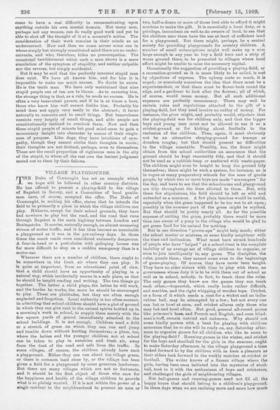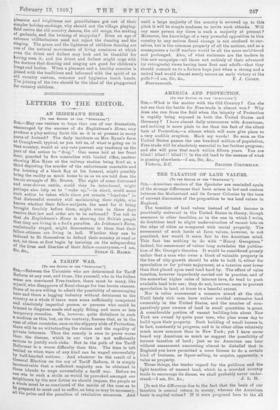VILLAGE PLAYGROUNDS.
Wherever there are a number of children, there ought to be somewhere in the fresh air where they can play. It is quite as important, from an educational point of view, that a child should have an opportunity of playing in a natural way, which incidentally means in a safe place, as that he should be taught reading and writing. The two things go together. The better a child plays, the better he will work, and the harder he works, the more he should be encouraged to play. These are platitudes, but they are often enough neglected and forgotten. Local authority is too often content, in admitting that school-children should have a plot of ground in which they can give vent to the animal spirits bottled up in a morning's work in school, to supply them merely with the few square yards of gravel immediately attached to the school buildings. It is not enough. Children need a field or a stretch of grass on which they can run and jump and tumble down without hurting themselves; a place, too, where the babies and the younger children not at school can be taken to play in sunshine and fresh air, away from the dust of the road and safe from the traffic. In some villages, of • course, the children already have such a playground. Either they can run about the village green, or there is common land close by, or the village has been given a field for a playground by some generous landowner. But there are many villages which are not so fortunate, and it should be the first object of those who care for the happiness and health of the village children to provide what is so plainlar wanted, If it is not within the power of a single resident in the neighbourhood to present an acre or two, half-a-dozen or more of those best able to afford it might combine to make the gift. It is essentially a local duty, or a privilege, incumbent on well-to-do owners of land, to see that the children near them have the use at least of sufficient land for a playground. But there might, perhaps, be a central society for providing playgrounds for country children. A number of small subscriptions might well make up a sum large enough in any year to buy a field here and a strip of waste ground there, to be presented to villages where local effort might be unable to raise the necessary capital.
Occasionally the suggestion of providing a playing-field, or
a recreation-ground as it is more likely to be called, is met by objections of expense. The upkeep costs so much, it is
urged; or somebody conceives the idea that there must be a superintendent, or that there must, be flower-beds round the edge, and a gardener to look after the flowers ; all of which, of course, would mean money. But all such additional expenses are perfectly unnecessary. There may well be certain rules and regulations attached to the gift of a playing-field, but they need involve no outlay of money. For instance, the giver might, and probably would, stipulate that the playing-field was for children only, and that the bigger boys and young men must not be allowed to use it as a cricket-ground or for kicking about footballs to the exclusion of the children. Then, again, it must obviously not be an attractive sleeping-ground for tramps or drunken roughs; but that should present no difficulties to the village constable. Possibly, too, the donor might obtain from the school authorities an assurance that the ground should be kept reasonably tidy, and that it should not be used as a rubbish-heap or scattered with waste-paper.
The children might eveu be taught to keep the ground tidy themselves; there might be such a system, for instance, as is iu vogue at many preparatory schools for the sons of gentle people, by which two or more boys are made " scavengers" for the day, and have to see that the schoolrooms and playground are tidy throughout the time allotted to them. But, with these few stipulations, the field should be left as wild and untended as a common. A few plain benches would be useful, especially when the grass happened to be too wet to it upon; possibly in the summer part of the grass might be scythed. But that should be pretty nearly all. As for the possible expense of cutting the grass, probably there would be more than one owner of a pony in the village who would be glad to get green food for his animal for nothing.
But in one direction "grown-ups" might help much; either the school master or mistress, or some kindly neighbour with the time and inclination. What must have struck hundreds of people who have "helped" at a school-treat is the complete inability of an average set of village children to organise, or even to join intelligently in, any game. The discipline, the rules, puzzle them; they cannot come even to the beginnings of game-playing. Of course, they have never been taught.
They have no elder sisters with time to play with them, no governesses whose duty it is to be with them out of school as well as in school, nobody, in fact, to teach them the rules.
The only games they know are the games they can teach each other,—hopscotch, which really looks rather difficult, and marbles, and the right whipping of wooden tops. Cricket, or a form of it which needs a coat for a wicket and an india- rubber ball, may be attempted by a few; but not every one can bat or bowl at once, and cricket allures only those who may bat and bowl often. But good, general all-round games like prisoner's base, and French and English, and even blind- man's-buff, remain untried and unknown. Why should not some kindly person with a bent for playing with children announce that he or she will be ready on, say, Saturday after- noon to organise games for all children who like to come to the playing-field P Running-games in the winter, and cricket for the boys and stoolball for the girls in the summer, ought to make Saturday afternoon, in the village playground a time looked forward to by the children with as keen a pleasure as their elders look forward to the weekly matches at cricket or football. The writer knows of a Sussex village where the girls, having been once initiated into the mysteries of stool- ball, took to it with the enthusiasm of boys and cricketers, and challenged the girls of neighbouring villages, But ball-games and running-games need not fill all the happy hours that should belong to a children's playground. In these days when we are realising more and more how much pleasure and brightness our grandfathers got out of their simpler holiday-makings, why should not the village playing- field revive the old country ,dances, the old songs, the making of garlands, and the twining of maypoles P Even an age of extreme utilitarianism need not reject the dancing and the singing. The grace and the lightness of children dancing are one of the natural movements of living creatures at which even the driest and dullest may look and be thankful for baying seen it; and the driest and dullest might urge with the doctors that dancing and singing are good for children's lungs and bodies. When a pleasant and a healthy exercise is joined with the traditions and informed with the spirit of an old country custom, romance and hygienics touch hands. The joining of the two should be the ideal of the playground for country children.










































 Previous page
Previous page